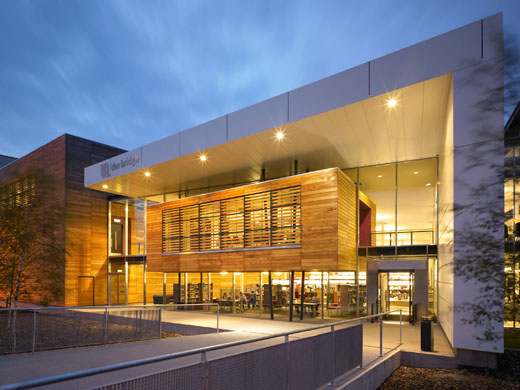At the university, home to the U.K.'s second oldest library science program, David McMenemy talked about libraries in the U.K. and the differences in degree programs for librarians in the U.K. and U.S. For example, library schools in the U.K. offer bachelors degree programs in library and information science and masters programs are generally only a year, which is proving very attractive to some American library students. One big difference in librarianship in the U.K. versus the U.S. is the attitude toward school libraries. We were shocked to learn that schools in the U.K. are not required to have a library and consequently most public schools don't. While there are naturally differences in librarianship across the Atlantic, Mr. McMenemy also shared with us some issues that libraries in the U.K. face that are similiar to issues we are facing in the U.S., particularly in relation to public library services. Issues such as drops in borrowing figures, attracting non-users, bridging the digital divide, deprofessionalisation, and measuring library services.
Christine Rooney-Browne, a graduate student at the university, shared with us some of her research which directly relates to measuring public library services. Her research will look at several different types of libraries in varying situations and will attempt to develop a methodology that can measure the social value of public libraries, rather than simply just issuing points. Her research was very exciting to hear about, and summed up really well by a quote she shared with us "People, their creativity and culture, remain elusive, always partly beyond the range of conventional inquiry."
Alan Poulter shared with us his work on FRILLS - Forensic Readiness for Local Libraries in Scotland. This program would be a way to track what people are doing on library computers and better monitor and deal with inapropriate and criminal use of public access computers. As he put it, an alternative to filters.
Library at The Bridge
 That afternoon, Mr. McMenemy and Ms. Rooney-Browne took us to The Bridge, a partnership between Glasgow City Council, Culture and Sport Glasgow, John Wheatley College and the Greater Easterhouse Arts Company. This partnership has resulted in an amazing space with a public library, community college, theatre, cafe, public swimming pool, dance studio and even a costume workshop and recording studio. The Library at the Bridge opened in July 2006, building off of the existing public pool and John Wheatley College. The center was created in response to the needs of the Easterhouse community, a very socially and economically disadvantaged area of Glasgow. The idea was to provide a space that encouraged the residents to improve themselves mentally, socially and physically, and in doing so, improving the general well-being of the community as a whole.
That afternoon, Mr. McMenemy and Ms. Rooney-Browne took us to The Bridge, a partnership between Glasgow City Council, Culture and Sport Glasgow, John Wheatley College and the Greater Easterhouse Arts Company. This partnership has resulted in an amazing space with a public library, community college, theatre, cafe, public swimming pool, dance studio and even a costume workshop and recording studio. The Library at the Bridge opened in July 2006, building off of the existing public pool and John Wheatley College. The center was created in response to the needs of the Easterhouse community, a very socially and economically disadvantaged area of Glasgow. The idea was to provide a space that encouraged the residents to improve themselves mentally, socially and physically, and in doing so, improving the general well-being of the community as a whole.
The building itself is a very modern, open space and has won several design and architecture awards And it's loud! But the noise just seems to provide energy. The book stacks are spaced out with plenty of seating between sections, and the signage is very accessible and understandable to a demographic that might not be very familiar with libraries -- for example, the sign next to the non-fiction section said "fact books" rather than non-fiction. The shelving in the children's section is on wheels so that the staff can rearrange the shelves to fit whatever activity is going on, making for a very flexible space.
As a community space, The Bridge is all about special programs. Some of the partnership programs that the library has done include: Healthy Reading Initiative, Careers Scotland, Easterhouse Writers' Group, literacy programs for adults and children and various youth programs.
And speaking of youth programs...one of the best stories I heard at The Bridge was regarding a group of younger teens who were coming to the library and causing trouble. Mr. Finney said that the library created a Friday night gaming group to get the kids involved in the library and that they haven't had any trouble from them since.
As far as hard numbers go, they also point to success: between April 2006 to March 2007 issues went up by 27%, visitors were up by 242%, PC bookings were up by 167%, reservations up by 25% and enquiries up by 17%.
Mr. Finney credits a lot of the library's success to the staff. He said it's one of the most "partnership-minded partnerships" he's ever been a part of. He said that he believes strongly that a library's success depends on just on what services you provide, but who is providing those services.
photos taken from www.architecture.com
No comments:
Post a Comment